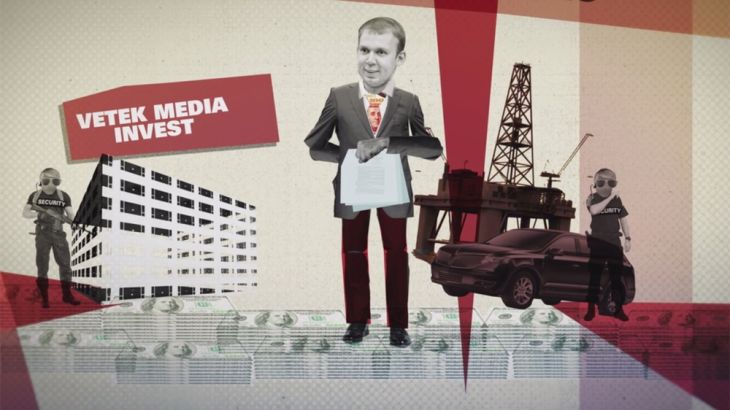‘The baby-faced gas king of Ukraine’
Al Jazeera probes a businessman who evidence suggests sold assets linked to former Ukrainian leader Viktor Yanukovich.

Each day in Moscow except Sunday, at about 6:30am, 18 security guards in five cars transport Serhiy Kurchenko from his gated home to his central Moscow office. They are armed, former Russian special forces.
On the back seat of the second car, the fugitive Ukrainian oligarch often asks impatiently when they will get there. If he doesn’t get an immediate response, the driver will be fired.
Keep reading
list of 4 itemsCohen admits to stealing and other takeaways from day 19 of Trump’s trial
Russian court hands 25 years to arson plotter accused of Ukraine links
Slovakia: PM Fico’s life no longer in danger after shooting, minister says
“It was the worst job I have ever had,” says one of the former chauffeurs.
“He is very inadequate,” says another, describing the oil and gas tycoon as “hyper-emotional”.
The two drivers paint a portrait of their former employer as a volatile and aggressive man.
They say he pursues vendettas against rivals, sacks staff at will, and displays numerous insecurities, such as trying to hide his bald patch.
Al Jazeera’s Investigative Unit filmed Kurchenko’s arrival at work, an elaborate process under maximum security that involves coordinating numerous guards and cars.
One vehicle carries a mobile phone signal blocker with a 200-metre range.
Another is a converted ambulance with a medic. The drivers say it was introduced after Kurchenko had an argument in a restaurant with a Chechen businessman.
Remarkable life
Kurchenko has lived a remarkable life. He shot to fame in 2012, aged just 27, dubbed the “Gas King” of Ukraine and claiming a net worth of $400m.
Two years later, he had fled to exile in Russia. Today, he lives under armed guard, moving between his home in a gated compound and his office on the 46th floor of one of the Russian capital’s tallest skyscrapers.
As with other oligarchs, it was buying a football club that brought notoriety. The transfer of Kharkiv’s FC Metalist sparked a flurry of questions from journalists in Ukraine.
Who was this baby-faced gas tycoon and where he had come from?
The answer, according to Kurchenko in one of his very few interviews, was that he had come from Kharkiv, worked hard in a local gas company since the age of 16, and then set up on his own. His success was due to expertise and cheap loans, he claimed.
Today, his football club is under Ukrainian state ownership and the oligarch is in exile, wanted at home and sanctioned in Europe and the United States.
“We can proudly inform residents of Kharkiv that FC Metalist will belong to them, not fugitive kleptocrats,” said Yuriy Lutsenko, Ukraine’s prosecutor general, as he announced the asset seizure.
It has become clear that Kurchenko is not a self-made man, but someone made by Russia and Viktor Yanukovich, the former Ukrainian president.
Yanukovich ensured there were no impediments for Kurchenko when importing gas and levied no tax on sales profits. Russia provided the gas at knock-down prices.
In return, Kurchenko shared his spoils. Ukrainian investigators have described him as the Yanukovich “family wallet”, doling out cash on demand to the now removed president, his son, and close associates.
Like a nobleman
Speaking to journalist Graham Stack on condition of anonymity, one of Kurchenko’s employees described the oligarch’s father.
“He would arrive once or twice a year to sign papers. He carried himself like a nobleman, smoked a pipe, walked with a stick and wore a greatcoat.”
Kurchenko’s habit of firing staff on a whim goes back to his father.
“He had tremendous bearing and we all bowed down before him. If he took a dislike to someone working for Serhiy, Serhiy would fire that person. His word was law,” the employee said.
Since then, Kurchenko has surrounded himself with other strong men. His former drivers say he is still close to Yanukovich.
One of them says he has seen Kurchenko and Yanukovich’s son, Alexander, together on several occasions.
“Some of the other drivers went to Sochi with Kurchenko and saw Yanukovich with him,” claims one of the chauffeurs.
Months after arriving in Moscow, Kurchenko worked to position himself as useful to the Russian government.
“When I did an interview with him, I understood that his task was to announce that he was in Russia and open to all offers,” says journalist Ivan Golunov.
“All the other Ukrainian exiles carried on quietly and completely denied that they were in Russia. Not Kurchenko. He openly said that he had business in Crimea,” he said.
Soon, the Russian government began using Kurchenko to help raise their war effort in the conflict areas.
“At some point, from 2015-2016, he became used for the supply of fuel and power to [the so-called] Luhansk and Donetsk People’s Republics (two separatists regions of Ukraine),” says Golunov.
In 2016, a Ukrainian hacker group released more than a gigabyte of emails from the Russian president’s political adviser, Vladislav Surkov, dubbed “The Kremlin Puppetmaster” by Western media.
The emails revealed Surkov and members of Russia’s spy agency had met Kurchenko.
The former chauffeurs knew how closely he was working with the Russian government.
They regularly drove him to the presidential administration, the Ministry of Economic Development and the Ministry of Natural Resources, as well as numerous banks and state-linked energy companies.
Kurchenko has gone from working for the Ukrainian government to its Russian counterpart, at a time when the two nations are at war.